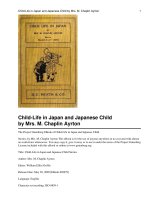How LGBT people is discriminated in Japan and what is legal protection measures for LGBT people
Bạn đang xem bản rút gọn của tài liệu. Xem và tải ngay bản đầy đủ của tài liệu tại đây (297.82 KB, 9 trang )
HANOI LAW UNIVERSITY
LAW OF HIGH QUALITY
Question: How LGBT people is discriminated in Japan and what is legal
protection measures for LGBT people?
MINISTRY OF JUSTICE
HANOI LAW UNIVERSITY
TEAMWORK ASSIGNMENT
SUBJECTS:
QUESTION:
NAME
:
CLASS
:
GROUP
:
Ha Noi, 2020
TABLE OF CONTENTS
I. Introduction.........................................................................................................3
II.
Body.................................................................................................................3
1. Definition of LGBT.............................................................................................3
2. How LGBT people is discriminated in Japan.....................................................4
3. Legal protection measures for LGBT people in Japan........................................5
3.1. First steps to change prejudice against LGBT in Japan...................................5
3.2. Discrimination protections...............................................................................6
III.
Conclusion.......................................................................................................7
LIST OF REFERENCES..........................................................................................8
I.
Introduction.
Homosexuality has existed for a long time in history, culture and religion in
every age of human society. Nowadays, there are an estimated 2.4 million LGBT
adults (or more fully LGBTQ +) in global, accounting for 2.5% of the population.
That means, for every 100 adults you meet, there are about 3 in the LGBT.
However, there are still many countries in the world that have discriminated LGBT
people and in Japan are no exception. Many young people think that Japan is a
paradise for LGBT people because of images in comics or movies. But is the truth
like that? Now, let’s take a look at “How LGBT people is discriminated in Japan
and what is legal protection measures for LGBT people?”
II. Body.
1. Definition of LGBT.
LGBT (or GLBT) is an initialism that stands for lesbian, gay, bisexual, and
transgender. In use since the 1990s, the term is an adaptation of the initialism LGB,
which was used to replace the term gay in reference to the LGBT community
beginning in the mid-to-late 1980s.1 A lesbian woman is one who is attracted to
1 Acronyms, Initialisms & Abbreviations Dictionary, Volume 1, Part 1. Gale Research Co., 1985, ISBN 978-0-81030683-7. Factsheet five, Issues 32–36, Mike Gunderloy, 1989.
women. A gay man is one who is attracted to men. A bisexual person is someone
who is attracted to people of genders both the same and different to their own.
Transgender is a term used to describe someone who does not conform to society’s
view of being a male or female, the sex which they were assigned at birth.
LGBT is the more commonly used term in the community; possibly because
it is more user friendly! You may also hear the terms “Queer Community” or
“Rainbow Community” used to describe LGBT people. This initialism and the
various terms are always evolving so don’t try to memorize the list. The most
important thing is to be respectful and use the terms that people prefer.
2. How LGBT people is discriminated in Japan.
Is Japan a country that accepts LGBT people?
It is difficult to get an accurate answer but it can be seen that Japanese
people (especially young people) are not too strict and prejudice against LGBT
people. Japan is a country with the majority of people following Shinto-Buddhism
beliefs so it is not too strict with the issue of homosexuality. Moreover, it is thought
that, because Buddhism is a strictly prohibited environment for women, it has
formed a homosexual culture.2 In addition, many Japanese do not follow any
religion so they are not bound by the rules of religion, so homosexual love is not
taboo.
Current Japanese law does not recognize same-sex marriage, so same-sex
relationships are not guaranteed the same rights as same-sex marriage. Through the
adoption permit regime, same-sex couples can get benefits close to those arising in
the spousal relationship, so adoption can be viewed as an alternative measure. The
replacement for same-sex marriage.
Regarding public opinion, quite a few people discussed deeply about the
rights of homosexual people, but also few people tended to discriminate against
them. However, there is also a part that laughs and makes fun of gay and
transgender people; This is because their consciousness and understanding are too
low. Although the sight of gay couples walking on the street, the Japanese do not
2 Fackler, Martin (12 February 2015). "District in Tokyo Plans to Extend Rights of Gay Couples". The New York
Times.
have much stigma or scrutiny but Japanese culture does not show excessive
affection in public so whether it is gay or heterosexual couple it should be noted.
Although the sight of gay couples walking on the street, the Japanese do not
have much stigma or scrutiny but Japanese culture does not show excessive
affection in public so whether it is gay or heterosexual couple it should be noted.
Tokyo Rainbow Pride is not the only pride march in Japan. The first pride in Japan
was held in 1994 and ever since there has always been at least one pride
somewhere in the country every single year in Tokyo, Osaka, Kobe, Kyoto,
Hokkaido, Fukuoka, Aichi and Okinawa.
Traditional male male romantic and sexual bonds found in feudal Japan have
little to do with today’s level of acceptance of queerness Western cultures and
values imported during the Meiji era and the country’s rapid militarization coupled
with policies about families and reproduction created a huge disconnect in sexual
cultures and ideas about intimacy between before and after Meiji.
Because they see lots of gay men, trans women and effeminate men on TV
everyday and some of them have been around for decades and some of them were
new it’s to easy to assume that the med – the Japanese mass media have been quite
LGBT friendly for decades. But the same is simply not true for lesbian women.
One example is Naomi Sagara, she was a very popular award-winning singer but
as soon as she got outed as lesbian. The showbiz industry kicked her out
permanently.3
3. Legal protection measures for LGBT people in Japan.
3.1. First steps to change prejudice against LGBT in Japan.
Fukuoka, a city in southwestern Japan, has recognized the LGBT
community, breaking the long-held prejudice against the community. Fukuoka
3 Snow, Nancy (30 September 2017). "Japan's race for the LGBT gold in Asia". Japan Today. Retrieved 16 October
2017.
became the seventh autonomous city in Japan to issue LGBT community
recognition rights after Tokyo's Shibuya district did the same in 2015.
The Tokyo Rainbow Pride parade, which takes place every year in the center
of Shibuya, is a testament to the Japanese opening their arms to the LGBT
community in Japan in particular and in the world in general. This annual event
attracts thousands of participants.
Japanese people are gradually aware of the existence and significance of the
LGBT community, despite prejudices and the "silent" to society. But art has always
been a "home ground" for this group of people to open up. The frequency of
homosexual images appearing on anime, books, movies even in music is not a
small number. So that, from music to politics, the views of the Japanese people are
also more open.
3.2.
Discrimination protections.
Article 24 of the Japanese Constitution states that "Marriage is based only on
the consent of both genders and it will be maintained through mutual cooperation
with the equal rights of husband and wife as the basis". Therefore, articles 731 to
737 of the Japanese Civil Code restrict marriage to heterosexual couples.
Homosexual couples cannot marry and same-sex couples are not granted the right
to marry. In addition, same-sex marriage performed abroad is not legally
recognized in Japan and same-sex couples cannot obtain a visa for foreign partners
based on their relationship. In March 2009, Japan began allowing Japanese citizens
to marry same-sex partners in countries where same-sex marriage is legal.
As of 2019, sexual orientation or gender identity is not protected by national
civil rights laws, which means that LGBT Japanese have few legal recourses when
they face such discrimination in such areas as employment, education, housing,
health care and banking. According to a Dentsu Diversity Lab survey, more than
65% of questioned LGBT people said they had not come out to anyone at work or
home.
In 2013, Yodogawa-ku, Osaka became the first Japanese government area to
pass a resolution officiating support for LGBT inclusion, including mandating
LGBT sensitivity training for ward staff. In October 2018, the Tokyo Metropolitan
Government passed a law prohibiting all discrimination on the basis of sexual
orientation and gender identity. The law, scheduled to take effect in April 2019,
also commits the Government to raise awareness of LGBT people and "conduct
measures needed to make sure human rights values are rooted in all corners of the
city". The law outlaws expressing hateful rhetoric in public. Prior to this, the wards
of Shibuya and Setagaya had already passed explicit protections for LGBT people.
In December 2018, four political parties, the Constitutional Democratic Party of
Japan, the Democratic Party for the People, the Japanese Communist Party, and the
Liberal Party along with the support of several independents, introduced to the
House of Representatives a bill entitled the Proposed Law on the Promotion of the
Elimination of Discrimination based on Sexual Orientation and Gender Identity to
prohibit discrimination, harassment and bullying at schools on the basis of sexual
orientation.
In March 2019, legislation banning discrimination against "sexual
minorities" was passed in Ibaraki Prefecture.
III. Conclusion.
One thing Japan and the LGBT community have in common are relatively
high suicide rates, and the sooner LGBT people are accepted worldwide, the
sooner those rates can begin declining. It is important for everyone to recognize
that there is a serious problem that is close at hand and touches the daily lives. In
the future, the government will also set up counseling centers dedicated to the
continental community to make it easier to support the LGBT. It is also a new
development step of Japan and the LGBT in the world in particular.
LIST OF REFERENCES
1. Acronyms, Initialisms & Abbreviations Dictionary, Volume 1, Part 1. Gale
Research Co., 1985, ISBN 978-0-8103-0683-7. Factsheet five, Issues 32–36,
Mike Gunderloy, 1989.
2. Fackler, Martin (12 February 2015). "District in Tokyo Plans to Extend
Rights of Gay Couples". The New York Times.
3. Snow, Nancy (30 September 2017). "Japan's race for the LGBT gold in
4.
Asia". Japan Today. Retrieved 16 October 2017.
/>
5.
equality-for-lgbt-people/
/>









